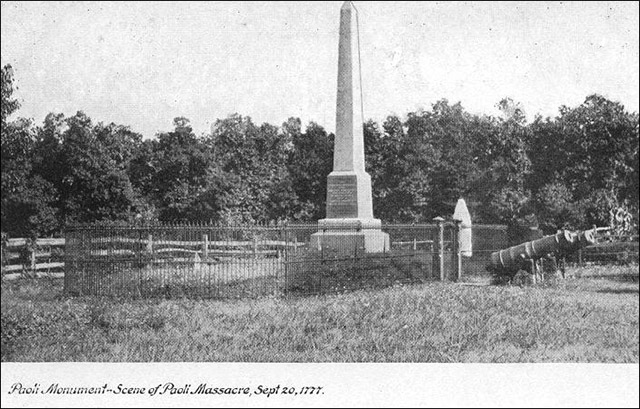|
Home : Quarterly Archives : Volume 44 |
Tredyffrin Easttown Historical Society |
|
Source: Summer 2007 Volume 44 Number 3, Pages 93–95 The Importance of the Paoli Massacre Editor's note – Philip won the Silver Award, the second prize, in the first annual Mildred Kirkner Memorial Essay Contest sponsored by the Tredyffrin Easttown Historical Society, for juniors and seniors at Conestoga High School. He wrote his essay in the spring of 2006 when he was a junior and was awarded the prize of $150 in the fall of 2006. The battle of Paoli has been almost completely overlooked by history. When I first moved to Pennsylvania from Chicago, I had never heard about it, or ever learned of its historical significance. Even studying American history in Paoli, the battle is never brought up, and internet searches prove all but futile. To be fair, the battlegrounds themselves are in Willistown Township and in the present borough of Malvern. However, much of the activity before and after the battle took place in Tredyffrin and Easttown Townships. [Note 1] So my hometown has a claim to it, but the question remains, why has history overlooked the massacre and what was the actual significance? Upon first inspection, it appears to be a military disaster that is a blemish on the record of our local General, Anthony Wayne. Further scrutiny reveals a battle that was skillfully manipulated by the patriots to turn all 53 dead Americans into martyrs, propelling many bystanders firmly onto the patriot side. The Paoli Massacre changed the course of the war by rallying Americans on the fence to the cause of the patriots.
Paoli Monument – Scene of Paoli Massacre, Sept 20, 1777. Postcard ca. 1908. The small obelisk was erected in 1817 at the 40th anniversary of the massacre. The large obelisk was erected in 1877 at the 100th anniversary. Courtesy Malvern Historical Commission. To understand the significance, the actual event must be completely understood, and several key events and important people make up the events leading up to, and after September 21, 1777. General Washington left Anthony Wayne in charge of 1,500 men to keep the army of General Howe occupied, and to hold them off from taking Philadelphia. Both armies needed time to regroup after the Battle of Brandywine; medicine was less developed at the time, and surgeons were usually called in to stop the spread of an infection by amputation. It was a sad fact that "during the American Revolution, more soldiers died from illness than from combat." [Note 2] With the total killed only around half of those injured, its easy to see how an event would be viewed as barbaric, if the British did not get them the first time around, the infection was sure to finish the job. To oversimplify the rest: the British learned of the American force and were able to surprise them with bayonets and swords drawn. General "No Flint" Grey (the name was coined later, referring to his instructions for the attack) demanded his soldiers to never fire a shot. Genius by some views, barbaric by others, it meant that whoever fired a shot was American, and could then be struck down. Though many of the statistics hover within a few deaths, the common report states, "53 Americans were killed and over 100 wounded in Grey's lightning raid." Common reports that the British used bayonets, and the rumor that the British burned and stabbed Americans attempting to surrender, granting no quarter, painted a barbaric scene for many locals that led many to ally themselves with the more civilized party. [Note 3] For the rest of the war, the British were afraid Wayne's troops would deny quarter to any soldiers. Several aspects combine together to create the belief that a massacre took place. Very little was accomplished in the way of defense, calling the event a battle would imply that there was some question as to who would win. The British had the advantage to the fullest extent of the definition, and managed to exploit their tactical superiority in several ways. Even though Anthony Wayne grew up in the area, his army was inexperienced, and weapons of the time were not accurate or fast enough to fight efficiently at short notice, also the night was damp, reminiscent of England for the British soldiers I'm sure, but not very helpful to those attempting to use arms. With many of the Americans untrained in the ways of close quarters combat, many fled, which is what helped save so many of their lives. The Battle of the Clouds, just a couple of weeks before, had shown what rain could do to ammunition. Ironically enough, as I argue that Paoli was not much of a battle, the Battle of the Clouds was similar, basically called off for rain. If the men who died at Paoli had not been made into martyrs, history would have dramatically changed. History has commonly painted the Patriot cause as wildly popular, and so heroic that it would seem crazy for anyone to be against it. Unfortunately the truth is less appealing. Many citizens impartial in many regards, easily swayed by an impassioned pastor, choosing which side was more beneficial for them, rather than choosing freedom from the crown, many had their family's futures in mind; many of us would make the same decision. As is typical when it comes to humans, we love to rally behind the moral cause, and are easily swayed by propaganda, sometimes trusting that other humans would tell us the truth; it would be almost funny if our gullibility had not caused so much bloodshed throughout time. By painting the attack as a massacre, the citizens rallied behind the patriots. The many men that were cut down by the bayonet attested to the British brutality. With the fence sitters beginning to lean towards the Americans, something amazing happened: little fanners found that they were able to repel the best trained army in the world. Previous to the massacre, much of the army was well off for men, but lacking most supplies. As supplies moved in, the men slowly deserted, many fearing the literally boatloads of British regulars who had just arrived. [Note 4] The Philadelphia campaign was one of paramount importance to the Americans. We've all heard about Germantown and Valley Forge, but it seems to me that the Paoli Massacre is what led so many men to join the crusade for independence. If one part of the American defense had failed back then, it all would have fallen, and my paper may have a slightly different topic, revolving more around those evil rebels that tried to ruin the crown. "Remember the Alamo" seems to be known by all, but that really didn't change the course of American history. By 1836 a battle hundreds of miles away didn't change how America ran, or what the future held in store, but a battle of large impact has been overlooked completely. The phrase "Remember Paoli" was yelled by many freedom fighters to demand that the British receive no quarter, but unfortunately for them, we do not remember Paoli. The American Pageant textbook sums it up nicely "late in 1777, George Washington] was defeated in two pitched battles, at Brandywine Creek and Germantown." [Note 5] Now some event happened between those two historic battles; it's easy to judge significance based on bloodshed, but in doing so, one would be committing a grave mistake. In the same sense that Philadelphia was the hotbed for patriots, several key factors made Pennsylvania as a whole loyalist leaning. We can thank our Quaker heritage for our pacifist nature that will avoid open rebellion if possible. Many Americans had yet to decide where they stood when it came to independence, there were benefits both ways, but one way did not require risking lives. In Pennsylvania many of the loyalists were out in full force. Loyalists such as Joseph Galloway and the Alien brothers led the way in attempting to influence opinion. The British favored these men and set them up with positions in the new governments they established as they captured city after city. Joseph Galloway's task was to bring Philadelphia back under control of the crown, but it was obvious that his "real task was to prevent goods from reaching Washington's army and to suppress revolutionary activity. He hired spies and magistrates to root out disloyalty, but he also created an efficient and organized government for Philadelphia. Galloway believed that four out of every five Americans would prefer to remain loyal to the Crown if only they were given an effective government that could lead them to loyalty." [Note 6] Either Galloway was wrong in his belief about American loyalty, or he did not create an effective government; either way, it is easy to see why many people would choose to favor the British Empire rather than a bunch of untrained idealists. The Paoli Massacre changed the course of the war by rallying Americans on the fence to the cause of the patriots. Though it is clear to me how the massacre greatly influenced the course of the war by swaying public opinion, I am also able to see the opposing view point. To answer the question, why has history overlooked the massacre, the answer is in some people's minds: because it did not matter or influence anything. If we were to study all aspects of history, we would spend too much of our time learning from the past, and not enough time actually living out our lives. Naturally, lesser details have to be left out. On the other hand, as a recent transfer to Paoli, it's almost my civic responsibility to learn the history surrounding where I live, even if the stuff that happened in my backyard is not as influential as the events that happened across the street at Valley Forge. It's a wonderful feeling that the people that used to live here helped make America what it is today. Sources
Philip will attend Grove City College in the fall of 2007 as a freshman. He plans to study psychology and economics. He likes to play the piano and organ. He likes to “find things out for himself and used that energy to research the Paoli massacre.” September 28, 2007 photograph by Roger D. Thorne. |

